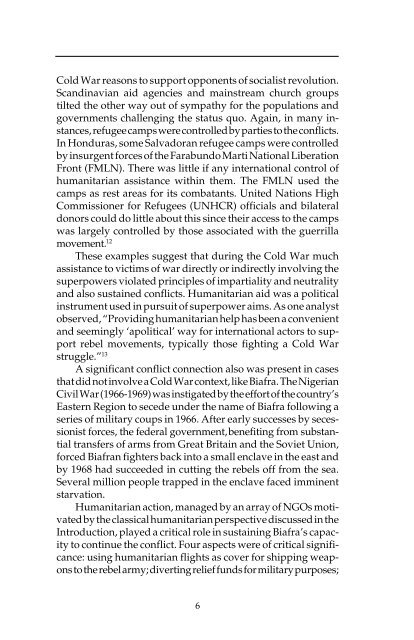Brown Cover OP 43 - The Watson Institute for International Studies
Brown Cover OP 43 - The Watson Institute for International Studies
Brown Cover OP 43 - The Watson Institute for International Studies
Create successful ePaper yourself
Turn your PDF publications into a flip-book with our unique Google optimized e-Paper software.
Cold War reasons to support opponents of socialist revolution.<br />
Scandinavian aid agencies and mainstream church groups<br />
tilted the other way out of sympathy <strong>for</strong> the populations and<br />
governments challenging the status quo. Again, in many instances,<br />
refugee camps were controlled by parties to the conflicts.<br />
In Honduras, some Salvadoran refugee camps were controlled<br />
by insurgent <strong>for</strong>ces of the Farabundo Marti National Liberation<br />
Front (FMLN). <strong>The</strong>re was little if any international control of<br />
humanitarian assistance within them. <strong>The</strong> FMLN used the<br />
camps as rest areas <strong>for</strong> its combatants. United Nations High<br />
Commissioner <strong>for</strong> Refugees (UNHCR) officials and bilateral<br />
donors could do little about this since their access to the camps<br />
was largely controlled by those associated with the guerrilla<br />
movement. 12<br />
<strong>The</strong>se examples suggest that during the Cold War much<br />
assistance to victims of war directly or indirectly involving the<br />
superpowers violated principles of impartiality and neutrality<br />
and also sustained conflicts. Humanitarian aid was a political<br />
instrument used in pursuit of superpower aims. As one analyst<br />
observed, “Providing humanitarian help has been a convenient<br />
and seemingly ‘apolitical’ way <strong>for</strong> international actors to support<br />
rebel movements, typically those fighting a Cold War<br />
struggle.” 13<br />
A significant conflict connection also was present in cases<br />
that did not involve a Cold War context, like Biafra. <strong>The</strong> Nigerian<br />
Civil War (1966-1969) was instigated by the ef<strong>for</strong>t of the country’s<br />
Eastern Region to secede under the name of Biafra following a<br />
series of military coups in 1966. After early successes by secessionist<br />
<strong>for</strong>ces, the federal government, benefiting from substantial<br />
transfers of arms from Great Britain and the Soviet Union,<br />
<strong>for</strong>ced Biafran fighters back into a small enclave in the east and<br />
by 1968 had succeeded in cutting the rebels off from the sea.<br />
Several million people trapped in the enclave faced imminent<br />
starvation.<br />
Humanitarian action, managed by an array of NGOs motivated<br />
by the classical humanitarian perspective discussed in the<br />
Introduction, played a critical role in sustaining Biafra’s capacity<br />
to continue the conflict. Four aspects were of critical significance:<br />
using humanitarian flights as cover <strong>for</strong> shipping weapons<br />
to the rebel army; diverting relief funds <strong>for</strong> military purposes;<br />
6

















